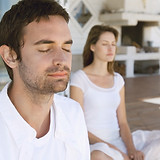Health Benefits of Massage
Reduce Back Pain, Body Aches and Knee Pain
Massage is most widely used to help reduce back pain. A study conducted in 2003 showed that “massage is better than acupuncture or spinal modification – reducing the need for prescription painkillers by 36%.”
More than one study has shown that headaches also respond to massage therapy. Swedish massage has been proven to be the most effective for knee osteoarthritis where massage one or two times a week had improvements in pain, stiffness and function.
Increase Blood Circulation
Massage increases blood flow, thereby decreasing lactic acid build up. Repeated compression and relaxation of the muscles causes blood vessels to be emptied and filled, which increases the removal of waste products like lactic acid. As a result, regular massage can greatly reduce muscle fatigue brought on by physical exertion.
Improve Immune System & Reduce Depression
A massage can improve immune or disease fighting system of the body, making it the ideal partner for certain treatments for people with cancer.
Massage reduces physical pain within the body, but is also been proven to reduce symptoms of anxiety and depression. This has been proven in a review of more than 12 studies. The studies showed that massage actually “lowered levels of cortisol by up to 50%,” while increasing levels of neurotransmitters that assist in reducing depression.
Reduce Stress
There have been quite a few studies done that have shown that massage can reduce both stress and heart rate. These studies have shown that after receiving a message, there has been a significant increase in the parasympathetic nervous system of the test subject. This system, also simply called PNS, counteracts any stress response produced by the sympathetic nervous system (SNS) in order to allow the body to come back into balance.
Improve sleep and treat insomnia
Sometimes sleeping can be hard because of stress, hormonal or schedule changes, temporary or chronic pain. Feeling sleepy or low energy the next day is bad, and insomnia increases depression, anxiety and problems with memory. Sleep insufficiency is linked to motor vehicle crashes, industrial disasters, and medical and other errors.
Many people resort to taking pain killers or sleep medication which can be habit forming and are not natural. Research has shown that massage reduces pain and anxiety but also increases relaxation, which can help restore your sleep pattern. Massage releases serotonin, which is the body's natural production of anti-pain chemicals. Massage is therefore very effective at increasing deep sleep.
Reduce Blood Pressure & Heart Attack Risk
Blood pressure is the force of blood pushing against blood vessel walls. High blood pressure, also called hypertension, is dangerous because it makes the heart work harder in order to pump blood to the body. This contributes to hardening of the arteries and the development of heart failure. Hypertensive adults who received regular biweekly massage sessions experience less depression and hostility and showed a decrease in measured stress-hormone levels, according to a recent research study.
Massage therapy patients show decreases in sitting diastolic and systolic blood pressure; decreases in salivary and urinary cortisol stress-hormone levels; and lower scores for depression, anxiety and hostility which lower risk or heart attacks.
RISKS OF MASSAGES
Massage may not be appropriate if you have:
-
Bleeding disorders or take blood-thinning medication
-
Burns or healing wounds
-
Deep vein thrombosis
-
Fractures
-
Severe osteoporosis
-
Severe thrombocytopenia
Discuss the pros and cons of massage with your doctor, especially if you are pregnant or you have cancer or unexplained pain.
Some forms of massage can leave you feeling a bit sore the next day. But massage shouldn't ordinarily be painful or uncomfortable. If any part of your massage doesn't feel right or is painful, speak up right away. Most serious problems come from too much pressure during massage.
SOURCES & ADDITIONAL READING
Sources:
– Hoffman, Matthew, MD (reviewed by). “Massage Therapy Styles and Health Benefits,” WebMD, LLC Medical Reference: July 30, 2008.
- Dryden T, Baskwill A, Preyde M. Massage therapy for the orthopedic patient: a review. Orthopedic Nursing. 23(5):327-32; quiz 333-4, 2004.
– Massage Magazine. “Research: High Blood Pressure Reduced by Massage Therapy,” Touch Research Institute. Originally reported in the Journal of Bodywork and Movement Therapies, January 2000, Vol. 4, No. 1.
- Hernandez-Reif, M., Field, T., Krasnegor, J., & Theakston, H. (2001). Lower back pain is reduced and range of motion increased after massage therapy. International Journal of Neuroscience, 106, 131-145.
– Pilch, Cynthia, PhD, CMT and Martha Brown Menard, PhD, CMT. “Massage and Stress: Understanding the Research,” Massage Therapy Journal: Summer 2007. Associated Bodywork and Massage Professionals.
– Shiatsu Massage Therapy History and Practice. “What is Shiatsu?” www.ultimatewatermassage.com: 2000-2008.
– Vanderbilt, Shirley. “Moderate vs. Light Pressure in Massage: New Studies from Touch Research Institute,” Massage and Bodywork Magazine, April/ May 2005.
– Wong, Cathy. “Alternative Medicine: Ten Most Popular Types of Massage Therapy,” About.com Health’s Disease and Condition content: September 19, 2007.
– Wong, Cathy. “Alternative Medicine: What is Shiatsu?” About.com Health’s Disease and Condition content: April 21, 2006.
– Massage Technique, “Petrissage,” spacourse.com, 2004.
- Field, T., Hernandez-Reif, M., Diego, M., & Fraser, M. (2007). Lower back pain and sleep disturbance are reduced following massage therapy. Journal of Bodywork and Movement Therapy, 11, 141-145.
– Draper, Shane “Effects of Intermittent Pneumatic Compression on Delayed Onset Muscle Soreness” etd.ohiolink.edu, 2011
- Field, T., Ironson, G., Scafidi, F., Nawrocki, T.,Goncalves, A., Burman, I. , Pickens, J., Fox, N., Schanberg, S., & Kuhn, C. (1996). Massage therapy reduces anxiety and enhances EEG pattern of alertness and math computations. International Journal of Neuroscience, 86, 197-205.










